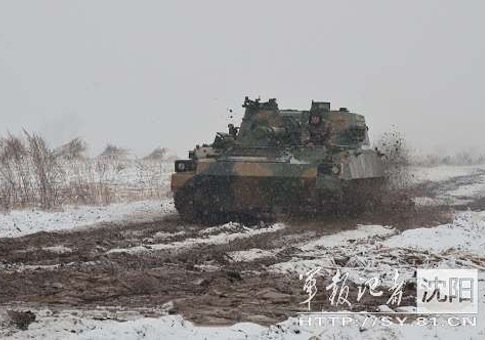China’s military is holding large-scale military maneuvers near the North Korean border amid new signs of political instability in Pyongyang.
U.S. military intelligence assets in Asia—including satellites, aircraft and ships—are monitoring the war games by the 39th Army Group that are part of the Shenyang military region.
A defense official said the war games are routine winter training and do not appear related to the ouster of No. 2 North Korean leader Jang Song Thaek, confirmed by the Pyongyang regime Sunday night.
The official pointed to a Chinese military newspaper report on the exercises.
The PLA Daily, the official military newspaper, reported Friday that the exercises began Dec. 4 and involved cold-weather operations of about 3,000 troops.
The maneuvers are taking place in the Changbai Mountains near China’s northeastern border with North Korea.
As part of the Chinese military’s efforts to increase realistic training, the exercises were carried out without site surveys or adaptation training before the winter season.
The exercises are said by the newspaper to simulate "real-war" training, a key theme of Chinese military training over the past several years.
"This training exercise will focus on researching movement, camouflage, billeting, command, and combat operations in the severely cold conditions of winter, and explore ways to build up the overall combat capabilities of units," 39th Group Army Commander Gen. Pan Liangshi was quoted as saying.
Additionally, the war games will involve training with electromagnetic warfare operations, including jamming and other types of electronic warfare.
Cold weather preparations included the installation of heated fuel lines in wheeled vehicles and jump starter batteries for armored vehicles. Wheeled vehicles were fitted with chains.
Disclosure of the war games comes as North Korea’s communist government confirmed the ouster of Jang Song Thaek, the uncle of Kim Jong Un who is considered the No. 2 leader in North Korea.
North Korean state radio announced that Jang, a Politburo member and vice chairman of the powerful National Defense Commission, had been removed from his positions and stripped of all power.
Jang was shown on state television being arrested at a Party meeting.
The report said Jang was part of an "anti-party and counter-revolutionary" faction that was labeled "extremely dangerous."
The faction was plotting within the ruling Workers Party of Korea to "challenge the party through factional maneuvers, while attempting to undermine the party's monolithic leadership."
According to the report, Jang and others committed "anti-state" and "anti-people" criminal acts and "double-dealing behind the scene [sic]."
Jang had been viewed as seeking closer ties to China and was involved in North Korea’s foreign economic relations.
He was accused of following the "capitalist way of life," seeking to take personal control of North Korean economic development and of selling off North Korean resources as "giveaway prices."
"The criminal acts committed by Jang Song Thaek and his followers are mind boggling, and they brought immensely harmful consequences to our party and revolution," the report said.
China’s military in the past has conducted military war games near North Korea.
Chinese leaders fear a breakdown in order in North Korea will send thousands of refugees into China.
China conducted similar war games in the spring when tensions were high over North Korean threats to attack the south.
The military activities between March and April coincided with reports that North Korea was preparing to conduct new and destabilizing tests of mobile KN-08 missiles.
The spring exercises took place in Jilin province and reports from the region indicated Chinese forces had been ordered to be on a heightened state of alert.
Those movements included PLA heavy armored vehicles, including tanks and armored personnel carriers, which were reported moving near the Yalu River that separates China from North Korea.
There is no indication the latest military maneuvers involve a heightened alert status.
